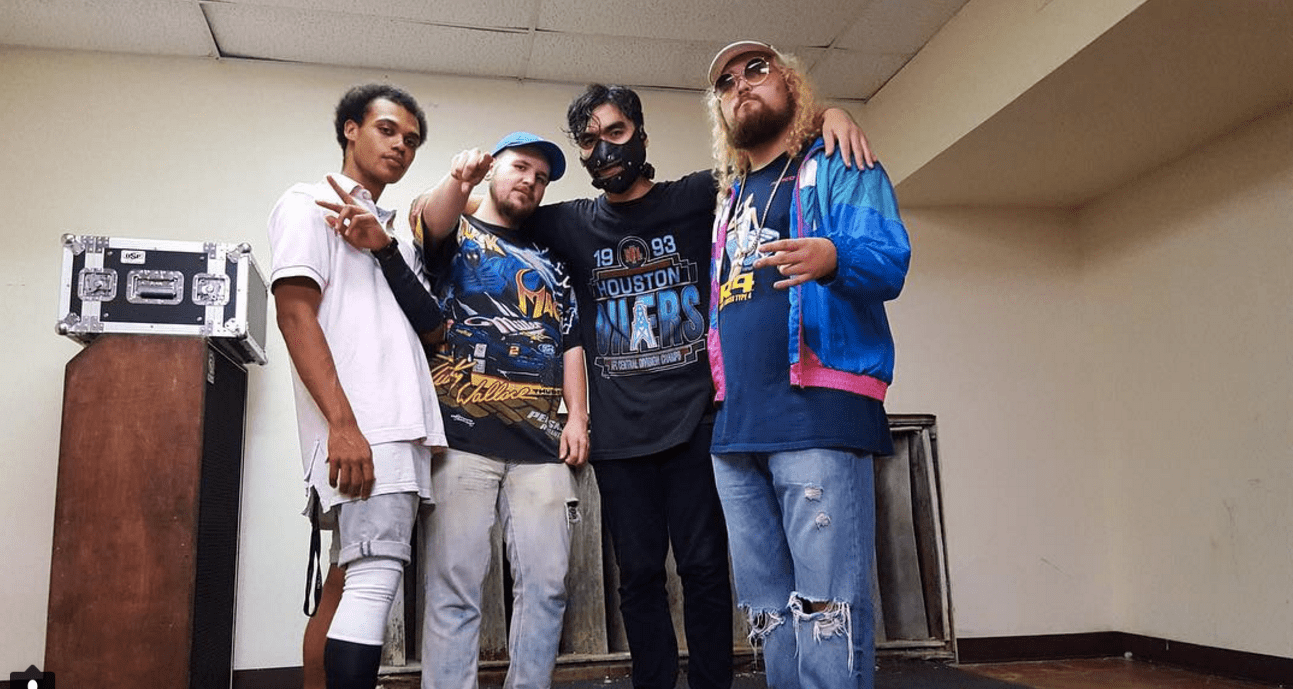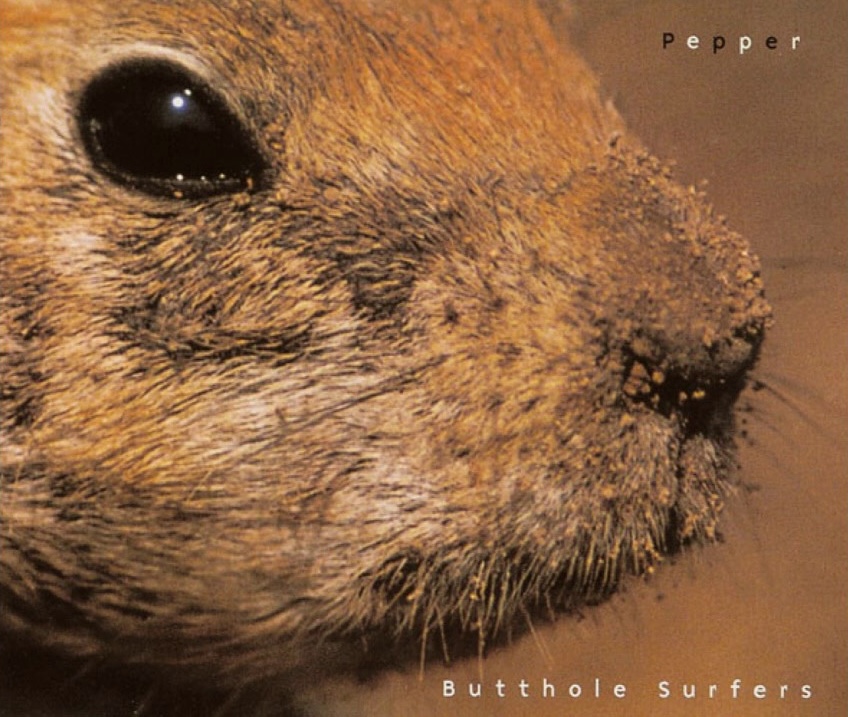Last week, the worst album of 2016 arrived in my inbox. It may eventually lose that title -- I haven't heard the She & Him Christmas album yet. But for now, Darke Complex's Point Oblivion is the absolute bottom of the barrel.
Honestly, I wasn't expecting it to be as awful as it was. Sure, I laughed as I skimmed the PR email, which claimed that the Houston, Texas quartet are "equally inspired by Slipknot and Linkin Park as they are by Travi$ Scott and Kanye West." But that didn't really mean anything; publicists will throw any random bullshit at writers to grab our attention for five seconds. Honestly, I was expecting generic synth-emo, the kind of thing labels like Rise and Victory and Sumerian have been excreting into the world on a seemingly weekly basis for years now. So, idly curious, I clicked on the link to their video, for the song "Void."
It lived up to its title.
It begins with a keyboard sound that'll remind you of at least three Linkin Park songs (so the publicist got at least that much right), as the four band members are shown in quick portrait shots, each lit in a different color. There's a black dude wearing safety glasses tilted up on his forehead (purple), jock dude in hockey jersey and baseball cap (red), a dude in satin baseball jacket, bleached perm, and Elton John's old sunglasses (yellow), and a dude in a mock turtleneck with spiked collar and some kind of black bondage mask covering the lower half of his face (green).
During the performance part of the video, a guitarist and bassist are shown, but their faces aren't -- they're human props, like the women in Robert Palmer videos from the '80s.
[videoembed size="full_width" alignment="center"][/videoembed]
The further into the song I got, the more depressed I felt. The drippy keyboards and crunching guitars; the way the drums aimed for groove and ended up just kind of bouncing in place; the migraine-inducingly predictable whiny singer in his bondage mask (and, at one point, a white cable-knit sweater) and the hockey-jersey dude, who raps in a voice surprisingly reminiscent of Suicidal Tendencies frontman Mike Muir...not only was "Void" nothing new, it was pure nü-metal, straight from the turn of the millennium.
Ultimately, I couldn't resist, and I downloaded the whole album. It wouldn't be fair to dissect it for you in detail, since it won't be out until mid-October, but in summary, it's garbage. Every song is a variation on the same vapid Linkin Park knockoff, with whine-to-a-scream vocals; pseudo-unhinged rapping; two-note guitar riffs; blocklike, locked-to-a-grid drumming; and lyrics that probably sound really furious and badass if you're 15 and sobbing them into your pillow 'cause your mom wouldn't let you go to that party. They even plagiarize themselves, reusing the same "la la la" chant on "Dead to Me" and "One of Us."
But why, I wondered? Seriously, it's 2016. How and why has nü-metal, loathed by virtually every music critic since its emergence, and routinely mocked by metal and mainstream rock fans alike, survived? Didn't we, as a society, grow out of this sometime in the last 15 years?
Nope.
Darke Complex aren't the only young band working this territory, either. Day One, the debut album from Pennsylvania band From Ashes To New, released in February, is every bit as turn-of-the-century as Point Oblivion. More established groups like Emmure, Attila, Of Mice & Men, and others have been plowing the nü groove for years. Hell, the pioneers of the style, Korn and Limp Bizkit, have never really gone away. (In fact, they've announced a co-headlining UK tour for December.) Fuck, Coal Chamber -- Coal Chamber! -- made a new album last year.
Even at its commercial peak, at the turn of the millennium, nü-metal was critically reviled. And while a few bands -- Slipknot and Deftones, mostly -- had their moments, the bulk of it was ugly, anti-melodic (at least until Linkin Park came along to inject some Depeche Mode into it), and monochrome. Every song had the same lurching groove, the same guitars downtuned so far they sounded like giant gears grinding together, the same whiny and/or shouty vocals...I wrote about so many of these bands, mostly for Alternative Press, in the early 2000s. Not just the big ones like Slipknot, Linkin Park, and Disturbed, either. I covered the second-tier bands like Staind and Static-X, and the total also-rans like Union Underground, Primer 55, and American Head Charge, too.
It's easy to be puzzled why bands like this keep popping up, and why they get signed (Darke Complex are on Spinefarm, a division of Universal Music), and why nü-metal continues to be such a strong influence on young musicians...until you think about it a little.
Part of it is generational. If, as seems likely, the guys in Darke Complex were in elementary and middle school when bands like Korn and Limp Bizkit were at their peak, then that sound will never not signify "heavy" and "awesome" to them. It's the same reason no one will ever love KISS as much as someone who was nine or 10 years old when they were at their peak in the late '70s. Something gets its hooks in you at a vulnerable age, and you belong to it forever.
Another part of it, I think, is geography. Even in the age of free streaming music, where everyone could theoretically be listening to the same things all the time, returning pop music to the state of consensus it had (or seemed to have) in the'70s, '80s, and '90s, local scenes persist -- sounds pop up in a given city, and never quite make it across the state line. Conversely, styles stay relevant in some areas long after falling out of fashion elsewhere. There are no nü-metal bands getting signed out of New York, but in Houston, or rural Pennsylvania, it apparently remains a valid artistic option. This is literally flyover-state music. (Which I don't automatically have a problem with -- I wrote about Five Finger Death Punch here almost exactly a year ago.)
And finally, we should just admit that nü-metal is actually still a relatively safe bet, commercially speaking. At its peak -- between 1998 and 2003, roughly -- bands that fell under that umbrella were routinely releasing records that went gold and platinum, and more than a decade later, many of the big names can still top the charts. Every Korn album since 1996's Life Is Peachy has gone top 10; seven of them have gone top 5, and two have hit #1. Linkin Park's Hybrid Theory went diamond (10x platinum). Every Disturbed album since 2002's Believe -- five in a row -- has debuted at #1.
So I guess I shouldn't be shocked that an album as depressingly derivative as Point Oblivion exists. I should be surprised there aren't dozens more just like it.






